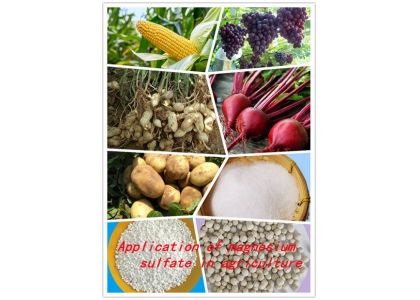
We may all be familiar with fertilizers. Plants and crops in daily life may be inseparable from fertilizers. With their assistance, they can grow more luxuriantly and yield better. And magnesium sulfate is the ideal raw material for making compound fertilizer, so let's learn about magnesium sulfate.
Magnesium sulfate is white or colorless acicular or oblique columnar crystal, which is easily soluble in water. It has one water, two water, three water, five water, anhydrous and heptahydrate magnesium sulfate. Magnesium sulfate usually refers to magnesium sulfate heptahydrate. Because it is easy to dissolve, it is easier to weigh than anhydrous magnesium sulfate, which is convenient for quantitative control in industry. It can be divided into industrial grade and feed grade. According to the size, there are three large particle sizes: 0.1-1mm, 1-3mm, 2-4mm.
For trace elements in Application of magnesium sulfate in agriculture, "sulfur" and "magnesium" have the following functions:
1) "Sulfur" is the main component of protein and enzyme in plants, which can promote the growth of roots, and always promote the vigorous growth of crops to increase yield; Sulfur is also an important component in the synthesis of amino acids and cellulose in crops.
2) "Magnesium" is the key element of chlorophyll, which can promote photosynthesis, improve the resistance of plants, promote the activity of enzymes, so that plants can fully absorb nutrients and grow more luxuriantly; "Magnesium" can also promote the formation of vitamin A and C, thereby improving the taste of crops
Therefore, magnesium sulfate can be mixed with nitrogen, phosphorus and potassium to form compound fertilizer according to different needs, or mixed with one or more raw materials to form various fertilizers. Moreover, through the test, the compound fertilizer containing magnesium can make the crops grow 15-20% more than the compound fertilizer without magnesium. It can be seen that magnesium sulfate is the only important raw material for the production of compound fertilizer.